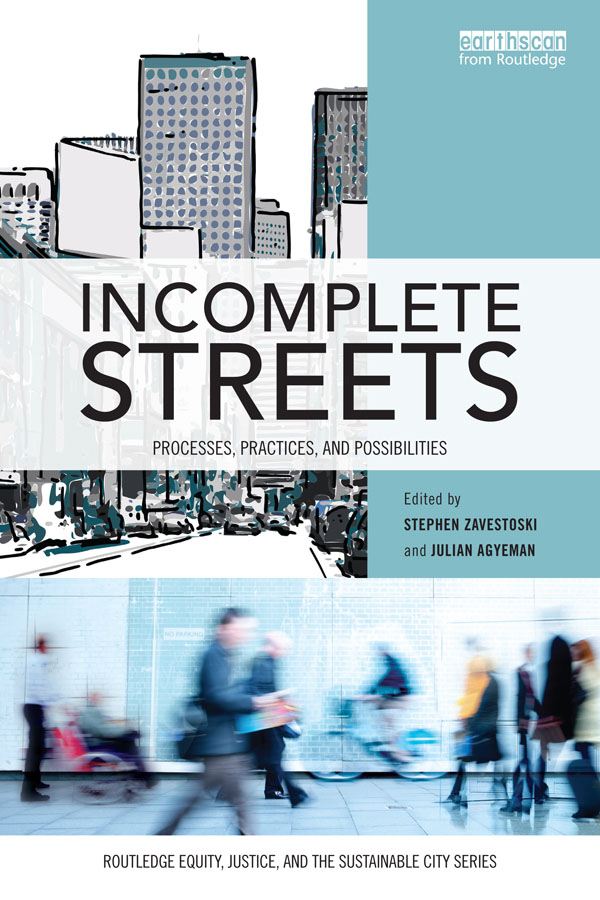Incomplete Streets: Processes, practices, and possibilities
 Published by: Routledge
Published by: RoutledgeRelease Date: September 5, 2014
Pages: 346
ISBN13: 978-0415725873
Buy the Book: Amazon, Barnes & Noble, IndieBound, Books-A-Million, Apple Books, Routledge
Overview
The ‘Complete Streets’ concept and movement in urban planning and policy has been hailed by many as a revolution that aims to challenge the auto-normative paradigm by reversing the broader effects of an urban form shaped by the logic of keeping automobiles moving. By enabling safe access for all users, Complete Streets promise to make cities more walkable and livable and at the same time more sustainable.
This book problematizes the Complete Streets concept by suggesting that streets should not be thought of as merely physical spaces, but as symbolic and social spaces. When important social and symbolic narratives are missing from the discourse and practice of Complete Streets, what actually results are incomplete streets. The volume questions whether the ways in which complete streets narratives, policies, plans and efforts are envisioned and implemented might be systematically reproducing many of the urban spatial and social inequalities and injustices that have characterized cities for the last century or more. From critiques of a “mobility bias” rooted in the neoliberal foundations of the Complete Streets concept, to concerns about resulting environmental gentrification, the chapters in Incomplete Streets variously call for planning processes that give voice to the historically marginalized and, more broadly, that approach streets as dynamic, fluid and public social places.
Reviews
“The “Complete Streets” approach seems to be a feasible way to improve access, health, and economic activity. But are we really challenging inequality and inequity by designing and building “Complete Streets”? This edited volume is thought provoking, and a good way to start the conversation about this urgent question.”
—Lois M. Takahashi, University of California, Los Angeles, USA
“Incomplete Streets asks important questions about how equitable Complete Streets really are. While seemingly benign, authors in this well-edited collection, argue that this vision of street design ignores key street users from sidewalk venders to low-wage auto commuters. This is a timely critique that deserves attention.”
—Ann Forsyth, Harvard University, USA
“Over the last 30 years our urban spaces have become increasingly neo-liberalised commodities and privatised public places. This timely collection reveals the contested space tensions and the successes that can be achieved in local streets. The Complete Streets movement will challenge attitudes of highways and engineering professionals, and those of urban planners too. We should refocus our attention to ‘people and places’ rather than ‘land users’ to become truly equitable and sustainable; afterall it is people that make places.”
—Mark Tewdwr-Jones, Newcastle University, UK
“This important book takes a hard look at the emerging movement for livability and asks the essential question: For whom? The authors’ unflinching, good humoured perspectives are essential reading for anyone who cares about the shape of our cities.”
—Elly Blue, Bikenomics Industrial Complex
“This volume offers an important critique of how potentially progressive ideas such as Complete Streets can be misunderstood or co-opted to maintain and exacerbate an unequal urban status quo. [It] is made up of a collection of chapters exploring the contested claims on streets in order to unpack the possibilities for fostering more equal public spaces through thinking of streets ‘not as fixed, but as constantly adapting and evolving physical, social, and symbolic spaces of creativity and contestation’”
—Rike Sitas, African Centre for Cities, Cape Town, South Africa